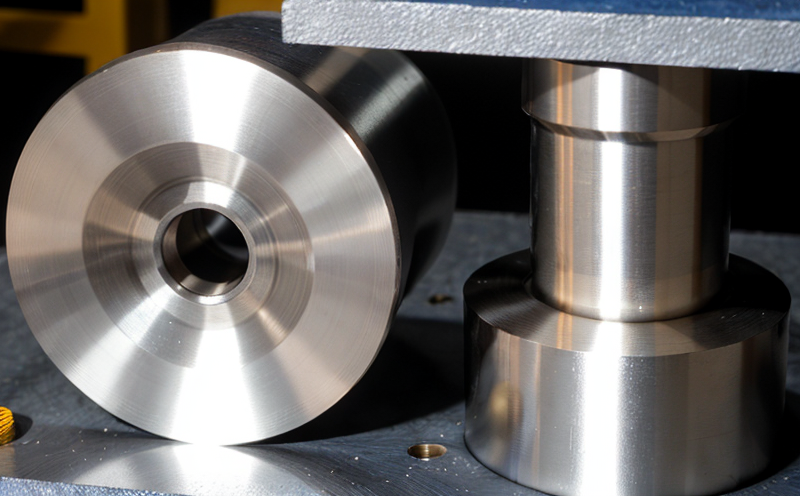ASTM E10 Brinell Hardness of Nanostructured Alloys
The ASTM E10 Brinell hardness testing method is widely recognized and used in materials science to determine the hardness of metallic materials. This method is particularly valuable for nanostructured metals and alloys, where understanding mechanical properties at the micro- and nanoscale can provide insights into material behavior that are critical for development and quality control.
Testing nanostructured metals and alloys using ASTM E10 requires careful attention to specimen preparation and testing parameters due to their unique structure. The small grain size or atomic arrangement in these materials can significantly influence hardness measurements, making it essential to use appropriate sample sizes and indenter diameters that do not distort the test results.
The Brinell hardness number (HB) is calculated based on the diameter of the indentation made by the steel ball indenter and the applied force. For nanostructured metals and alloys, this method can provide a reliable measure of hardness but must be adapted to ensure accurate readings. This adaptation includes selecting appropriate indenter diameters that do not affect the integrity of the sample during testing.
The process involves carefully preparing the specimen, typically by polishing it to a high degree of finish to minimize surface irregularities. The specimen is then subjected to an indentation force for a specified duration, after which the diameter of the indentation is measured. The Brinell hardness number (HB) is calculated using the formula:
Where F is the applied force in Newtons, and d and e are the diameters of the indentation and the indenter, respectively.
The accuracy and reliability of these tests depend heavily on standardized procedures. ASTM E10 provides detailed guidelines for specimen preparation, testing parameters, and data analysis to ensure consistent results across different laboratories. Understanding these standards is crucial for any organization dealing with nanostructured metals and alloys.
Given the complexity and precision required in testing nanostructured metals and alloys, it is advisable to consult with experienced professionals who can provide tailored advice and support throughout the process. This expertise ensures that tests are conducted according to best practices, leading to accurate and reliable results.
Industry Applications
| Application | Description |
|---|---|
| Bioengineering | Testing nanostructured metals and alloys for medical implants to ensure biocompatibility and strength. |
| Electronics Manufacturing | Evaluating the hardness of nanowires used in semiconductor manufacturing processes. |
| Aerospace Engineering | Determining the hardness of nanostructured materials for lightweight, high-strength components. |
| Catalysis Research | Assessing catalysts made from nanomaterials to optimize their performance in chemical reactions. |
| Automotive Industry | Characterizing the hardness of nanostructured alloys used in advanced vehicle components. |
| Energy Sector | Evaluating materials for nuclear reactors and renewable energy applications where high strength-to-weight ratios are crucial. |
| Consumer Goods | Testing nanomaterials used in the production of durable consumer electronics products. |
The ASTM E10 Brinell hardness test is applicable across various industries where nanostructured metals and alloys play a critical role. These materials are essential for developing advanced technologies that demand both high strength and light weight, ensuring reliability and performance in demanding applications.
Eurolab Advantages
At Eurolab, we offer comprehensive testing services specifically tailored to nanostructured metals and alloys. Our expertise lies in providing accurate and reliable Brinell hardness testing according to ASTM E10 standards. Here are some of the advantages our clients experience:
- State-of-the-Art Equipment: We use advanced equipment that ensures precise measurements and consistent results.
- Experienced Technicians: Our team of professionals has extensive experience in nanostructured materials testing, ensuring accurate interpretation of results.
- Dedicated Support: Clients receive personalized support from our technical experts to address any questions or concerns they may have during the testing process.
- Comprehensive Reporting: We provide detailed reports that include all relevant data and interpretations, making it easier for clients to understand their test results.
- Sustainability Focus: Eurolab is committed to sustainable practices, ensuring minimal environmental impact while maintaining high standards of testing.
With our commitment to excellence, we ensure that every client receives the highest quality service and support in nanostructured metals and alloys testing.
Quality and Reliability Assurance
EuroLab is dedicated to maintaining the highest standards of quality and reliability in all our services. To achieve this, we adhere strictly to international standards such as ASTM E10 for Brinell hardness testing. Our commitment to excellence is reflected in several key areas:
- Accreditation: Eurolab holds ISO/IEC 17025 accreditation, ensuring that our laboratories meet the highest quality and technical requirements.
- Continuous Improvement: We regularly update our testing methodologies to align with the latest scientific advancements and international standards.
- Training: Our staff undergo continuous training to stay abreast of new developments in materials science and testing techniques.
- Certified Personnel: All personnel involved in testing are certified by relevant bodies, ensuring that they have the necessary skills and knowledge.
- Quality Control: We implement stringent quality control measures at every stage of the testing process to ensure accuracy and reliability.
EuroLab’s unwavering commitment to quality and reliability ensures that our clients can trust in the results we provide. By adhering strictly to ASTM E10 standards, we deliver consistent and accurate Brinell hardness test results for nanostructured metals and alloys.





